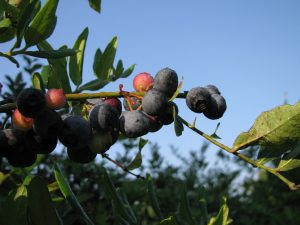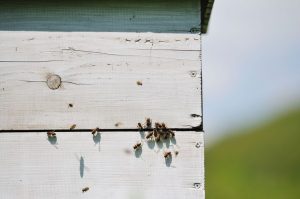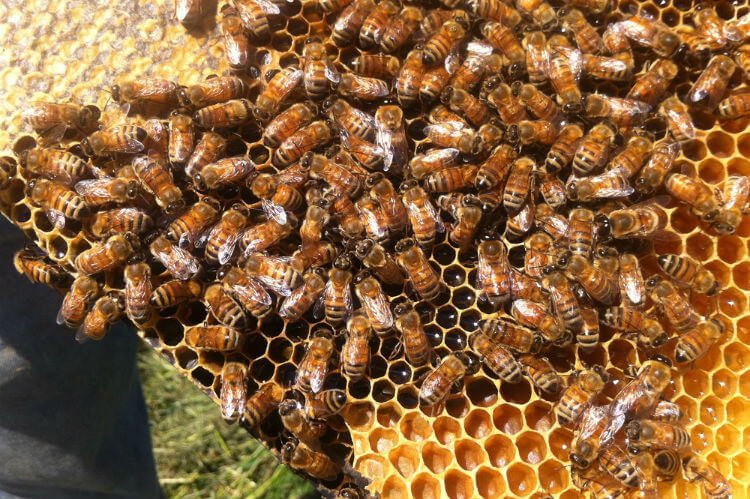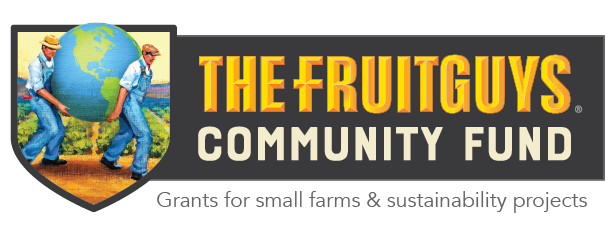Colchester Farm Community Supported Agriculture is a nonprofit farm based on 15 acres of land in Georgetown, Maryland. They grow a wide range of produce and also boast robust apprenticeship and educational programs for local kids, while distributing their produce through 170 Community Supported Agriculture (CSA) shares. In 2015 The FruitGuys gave them a $4,942 grant so they could expand their apiary, plant native pollinator habitat, and establish a blueberry patch protected with electrified deer fence to prevent significant crop loss.
The Berrys and the Bees
“We have added four colonies of bees to our farm this year. We used the funds that we received to buy the equipment to build the hives and to buy some of the bees,” says Theresa Mycek CSA Manager at Colchester Farm. “The hives have helped us to educate visitors about our continuous efforts toward supporting local bee populations and their importance in an ecosystem, particularly in relation to our growing operation. This summer we prepared the ground for the blueberry bushes and working up the soil where the pollinator strip will be located. We purchased the deer fence and have set it up around the future blueberry patch. We will soon be purchasing the seed with hopes to sow them in early September.”

The blueberries were planted earlier this year within the deer fence. They began seeding the pollinator strip in early November 2015 and didn’t expect the pollinator seed mix to germinate that fall. So they used oats to provide ground cover through the winter. This spring, they mowed down the oats as they were starting flower, and are still waiting to see how well the pollinator mix seeds have germinated.
The four new beehives successfully made it through the winter and are now an integral part of every visitor tour. The hives are a great tool to help prompt discussion about pollinators, habitat, and bee health. Colchester Farms plans to introduce farm apprentices to beekeeping and involve them in general tasks like hive maintenance and honey extraction.

Benefits Beyond the Initial Grant
Colchester Farm hopes that over the next few years their blueberry bushes will start producing fruit, further diversifying what they offer to members and the community. For their CSA members, they are hoping to offer pick-your-own blueberries, which will serve as an incentive to bring more people out to see and support the farm. The blueberry bushes will also provide food and habitat for pollinators, keeping the farm healthy as well as serving as a visitor attraction.
The benefit of the grant lives beyond the initial investment: the pollinator strip should serve as habitat and a food source for pollinators, helping to maintain a healthy population of pollinators and beneficial insects. In turn, these beneficial insects and pollinators should help increase yield and quality of crop production for many years to come.
Colchester Farm plans to maintain the beehives at the farm, training apprentices and introducing workshops related to honey bees and beekeeping. As the hives mature, they hope honey sales adds to the farm’s financially self-sustaining projects.
 Advice For Other Grant Applicants
Advice For Other Grant Applicants
CSA Manager Theresa Mycek said that she would advise other grant applicants to make sure to take into account the amount of time it will take to implement their grant projects. “It sounds like an obvious thing, but we tried to plan so that we were implementing the projects of the grant during times of the year that were traditionally a little less busy. But that didn’t always work out…mostly due to the weather not cooperating. For example, we had planned to plant the blueberries in April, but then because of weather, we were delayed into May when we have a lot more going on which wasn’t as ideal for us, but we made it happen”.
Another piece of advice she gave was to take more photos during the implementation stages, so you can see what things were like before and after.
What’s Next For Colchester Farm?
They have a few goals over the next few years including upgrading their wash station to better meet GAPs standards, improving and maintaining the soil health of the farm through cover cropping, composting, and reduced tillage. Colchester Farm also wants to put time into improving their apprenticeship program, and collecting and recording information to better evaluate their operations and make the farm more efficient.




